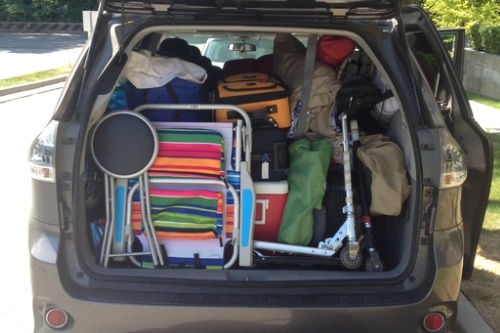Aviva urges caution as motorists load up vehicles for UK breaks

Four fifths of motorists don’t always check vehicles when adding extra loads
As summer holidays beckon, Aviva is urging drivers to take care when loading up their vehicles for UK breaks.
According to the insurer’s latest "How We Live" report, 53% of UK adults plan to take a break on their home turf this year, with 16% planning holiday cottage breaks and 13% intending to go camping. Two fifths (40%) say they are looking forward to using their cars for day-trips in the UK.
But in spite of the kit and caboodle that holidays and trips require, millions of motorists admit they don’t always carry out basic vehicle safety checks when adding extra loads to their cars or going on long journeys.
Eighty per cent say they don’t always test their tyre pressures when they increase or decrease the load in their vehicle. Similarly, the majority of motorists don’t always look at their levels of screen wash (77%), oil (70%) and coolant (74%) when embarking on long journeys.
This could mean potential problems on the roads, particularly in hot weather when under-inflated tyres are more susceptible to blow-outs.
Sarah Applegate, Head of Risk, Aviva General Insurance says: “Millions of holidaymakers are planning to take breaks within the UK this year. This is great news for UK tourism, but according to our research, possibly less positive for some of our vehicles!
“Problems can occur when people fill their cars with baggage and they aren’t used to driving with heavier loads - or fail to check their vehicles are prepared for long-distance trips before they leave their driveway.
“We’d therefore encourage customers to consider additional safety measures when planning and embarking on their road trips, in order to keep them safer on the road.”
Aviva has the following advice for drivers when driving to a holiday destination or taking a long trip:
Leave sufficient time for your trip and plan the route before leaving the house. Knowing how to get to your destination and not having to rush is a key component of driving safely. Make sure you’ve set up your sat-nav and planned your rest stop destinations ahead of time.
Keep your rear view clear. Make sure you don’t pack above the tops of the back seats. Poor visibility can make for reduced reaction time, should anything unexpected happen. If you know you’re going to be transporting bulky items, consider using a roof rack, roof box or a trailer.
Make sure your breakdown cover is sufficient for your needs. Some levels of cover only cover you to be transported to the nearest garage from the site of the breakdown, while others can transport you nationwide. If you know you need a specific type of cover, such as a courtesy vehicle or accommodation costs, make sure this is added to your policy ahead of time.
Avoid overloading your car. Heavy loads can have significant impact on the car’s steering and acceleration, as well as stopping distances. Make sure you’re used to driving with such a load before you leave for your main trip.
Check how much weight you can legally carry. If you exceed this weight, you can find yourself with extra points on your licence, should you be stopped by the police. You can find your car’s Maximum Authorised Mass in your manual or on the V5 – but remember, it includes yourself and all the passengers too!
Check your vehicle is road-trip ready. Check your oil levels, screen wash, coolant and your tyre pressures. This can go a long way in preventing avoidable breakdowns. It’s actually illegal to drive without screen wash, so be sure you don’t set off without it.
Consider cover for your belongings. Many car insurance policies have limited cover when it comes to belongings, so you might consider taking out personal belongings cover as an add-on to home insurance, which can cover personal items anywhere in the world. Similarly, travel policies with baggage cover can provide protection if your belongings or valuables are lost or stolen on your trip – even if the break is in the UK.
Take note if towing a trailer: A trailer can provide extra capacity for transporting bulky belongings, but it may be worth checking with your insurance provider if there are any special terms in relation to trailers. Aviva standard car insurance would insure you against Third Party Liability while a trailer is attached to your car. Customers don’t need to tell us that they are towing a trailer and there is no additional charge.
With regard to trailer loads, if you passed your car driving test on or after 1 January 1997 you can:
- Drive a car or van up to 3,500kg maximum authorised mass (MAM) towing a trailer of up to 750kg MAM.
- Tow a trailer over 750kg MAM as long as the combined MAM of the trailer and towing vehicle is no more than 3,500kg.
If you want to tow anything heavier though, you’ll need to take a special car and trailer driving test.
Authored by AVIVA
About Aviva
Aviva Insurance Limited is one of the UK’s leading insurance companies, part of the Aviva group with 34 million customers Worldwide. Aviva Insurance has been in the insurance business for more than 300 years.
In UK commercial, the insurance market remains challenging for insurance brokers and customers, due to the ongoing economic conditions. Aviva Insurance are focusing on improving our processes to ensure Aviva provide commercial customers with insurance cover at an acceptable price. Insurance brokers also recognised our excellent customer service by voting us Insurance Times General Insurer of the Year in 2012, for the second year running. youTalk-insurance sharing Aviva insurance news and video.

